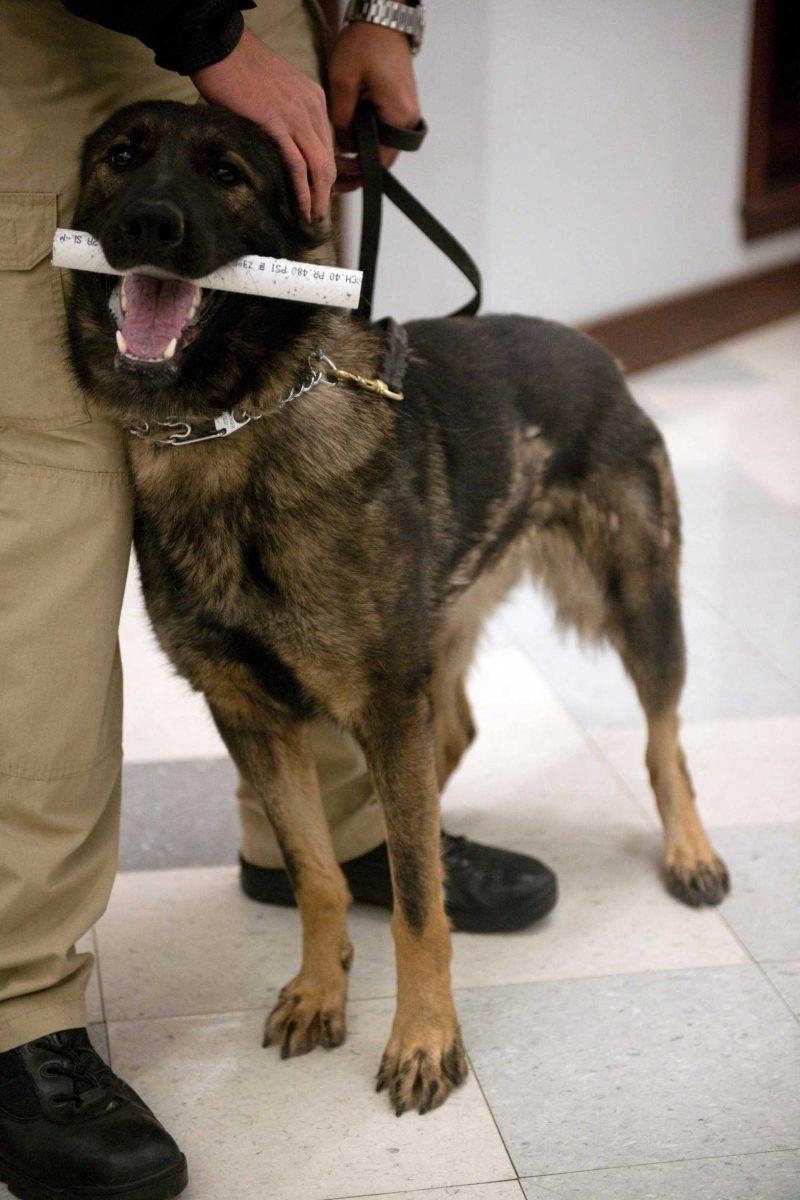The LSU Police Department has added a new member to its team — and she has a nose for crime.
Meggie, a 2-year-old German shepherd, became a part of the force in November, making her the University’s first narcotics detection canine.
While Meggie isn’t the first canine owned by LSUPD, she is the first trained in detection, according to Sgt. Blake Tabor, LSUPD spokesman.
Tabor said LSUPD currently has an explosives detection canine named Sindy, who has been with the team about four years. He said the department owned a second dog, but she recently retired because of an injury.
“In her place, we made the decision to get a narcotics sniffing dog,” he said. “We didn’t get her because of a drug problem on campus — she was obtained because of her ability to keep drugs to a minimum.”
And that’s when Christopher Masters, LSUPD officer and certified canine handler, began preparing.
“Masters has experience as an explosives detection handler, and he took a lot of initiative to get the dog,” Tabor said. “Masters was asked by the chief to do research and determine how a detection canine could benefit the LSU community.”
The next step was a trip to U.S. K-9 Unlimited, a canine training facility in Kaplan that specializes in purchasing, selling and training detection canines for law enforcement and government agencies. The majority of the dogs for sale are German shepherds and Belgian malinois breeds, which are known for their agility and obedience.
The dogs are hand-selected based on quality and trained to the highest standards, according to the U.S. K-9 website. The facility has about 25 dogs in its kennels for sale at all times, imported from around the world. Meggie is originally from Holland.
“They show you all of the dogs available,” Masters said. “I liked Meggie’s personality.”
Masters said he knew the sleek black-and-gold female was a perfect match, noting how alert and motivated she was.
He said he also wanted to purchase a female dog because he finds them easier to train.
After purchasing Meggie, Masters was required to enroll in a four-week handler’s training course, where he learned proper handling and how to work effectively with the dog.
But the training didn’t stop there.
Tabor said Masters is required to take Meggie to K-9 Concepts, Inc., a training facility in Broussard, once a month for an eight-hour day to make sure she’s up to speed. He said Meggie’s training consists of placing narcotics in various locations, vehicles and buildings for her to find.
Masters must also keep her familiarized with her obedience training on a daily basis.
Tabor said the training has paid off, as Meggie has already made an impressive find.
On her first night on the job, Meggie discovered nine bags of marijuana after a traffic stop near the University Recreation Center Complex. The bags, which were hidden in the front of the vehicle, collectively contained about 18 grams of marijuana.
“When you are off searching for a narcotic, it’s sometimes easy to miss,” Tabor said. “She makes our job easier — no officer has the sense of smell a canine does.”
Tabor said officers are able to focus on a situation more effectively when a canine is present.
“She has done nothing but good things, and we have only scraped the surface on the benefits of Meggie,” he said.
Masters also said he continues to be impressed by her work.
“I enjoy working with Meggie a lot better than working with a human,” he said. “You can never have a disagreement with a canine.”
Tabor said Masters works with Meggie on a rotating schedule determined by “criminal elements and crime trends.” He said Meggie will not be routinely walked around the residence halls. She will only respond when needed.
“She is like the dog around our house,” Tabor laughed. “But she is understood as a police officer and trained to protect her owner.”
Tabor said she has proved herself to be an asset in more than one way.
And when Meggie isn’t sniffing out crime, she can be found at Masters’ house with him or riding around in the police vehicle patrolling the campus.
“I’ve developed a bond with the dog,” Masters said. “I’m with the dog more than I’m with my family.”
____
Contact Sydni Dunn at sdunn@lsureveille.com
LSUPD purchases first narcotics detection canine
February 6, 2011
LSU Police Department Officer Christopher Masters handles Meggie, the officers’ first narcotics detection dog, Thursday. Meggie is from Holland and will work on a rotating schedule determined by “criminal elements and crime trends.”






